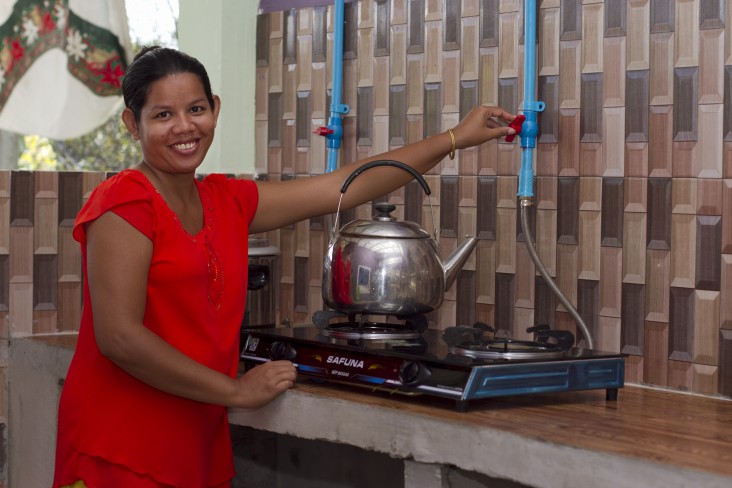Speeches Shim

April 2018 — Channeuon Kob awoke at the first light of day to fix breakfast for her family. Now that she would no longer have to smell gas fumes as she prepared breakfast, she was eager to cook. Kob recently purchased a clean cookstove to replace her butane gas cylinders as part of a new biodigester system that converts waste into fuel.
Biodigesters — which consist mainly of a large tank — collect, treat and convert manure and biowaste (human, kitchen and green waste) into clean biogas for cooking and organic fertilizer for crops. For a typical Cambodian rural farming family with two or three livestock, a biodigester system can often provide enough biogas to meet all daily cooking needs.
Eighty percent of Cambodian families in rural areas still use wood as the primary fuel source for cooking. When combined with a clean cookstove, a biodigester system creates a smoke-free cooking environment, producing benefits to respiratory health and safety, particularly for women and children.
Butane gas bottles are used for special occasions or when wood is not available. Although it is more convenient to cook using butane gas, low-quality cylinders and stoves present safety issues — explosions are not uncommon. A biodigester can also save considerable money due to lower fuel consumption.
In comparison to either wood or butane gas fuel systems, biodigesters are cheaper and safer for cooking while producing high-quality organic fertilizer.
Kob purchased her new system from the Cambodian social enterprise firm ATEC Biodigesters International, which developed the world’s first “plug-and-play” biogas digester that can be installed in high groundwater and flood-prone areas. Kob saw the benefits of her purchase immediately.
“The ATEC’s biodigester is a life changer for me,” said Kob. “Since switching from my gas cylinders to this ATEC’s biodigester, I am able to save $260 per year from my fuel expenses. I feel much safer while cooking. My kitchen is now filled with the aroma of the food I cook, not the smell of cooking gas from the gas cylinders. This biodigester uses waste around the house, so I would definitely recommend it to friends and relatives who have to walk far to collect wood for cooking.”
The USAID Private Financing Advisory Network-Asia (USAID PFAN-Asia) supported ATEC throughout its participation last year at the 7th Asian Forum for Clean Energy Financing (AFCEF-7) business plan competition. The network helped ATEC refine its business plan and develop financial projections. As a result, the company has mobilized $700,000 in equity. The investment was made by a consortium of investors led by Small Giants of Australia and consisting of Fondation Ensemble and ENGIE Rassembleurs d’Energies, both of France, in addition to another private Australian investor. ATEC was second runner-up at PFAN’s AFCEF-7 forum and global winner of its investor forum in Vienna.
“This new round of funding will enable us to expand production to 10,000 units per year in Cambodia and export to other emerging markets,” says Ben Jeffreys, CEO of ATEC. “We expect our biodigesters will benefit as many as 20,000 people in 13 provinces of Cambodia by 2020.”
USAID PFAN-Asia, which started in 2013 and concluded in January 2018, helps companies pitch their projects to investors and improve their business plans. The program assisted 49 companies to mobilize more than $567.5 million in funds directly or indirectly for clean energy investments that will avoid or reduce 17.7 million tons of carbon dioxide equivalent. The program is also helping create self-sustaining, long-term access to regional clean energy financing.
LINKS
Follow @USAIDAsia, on Facebook, on Flickr, on YouTube

Comment
Make a general inquiry or suggest an improvement.